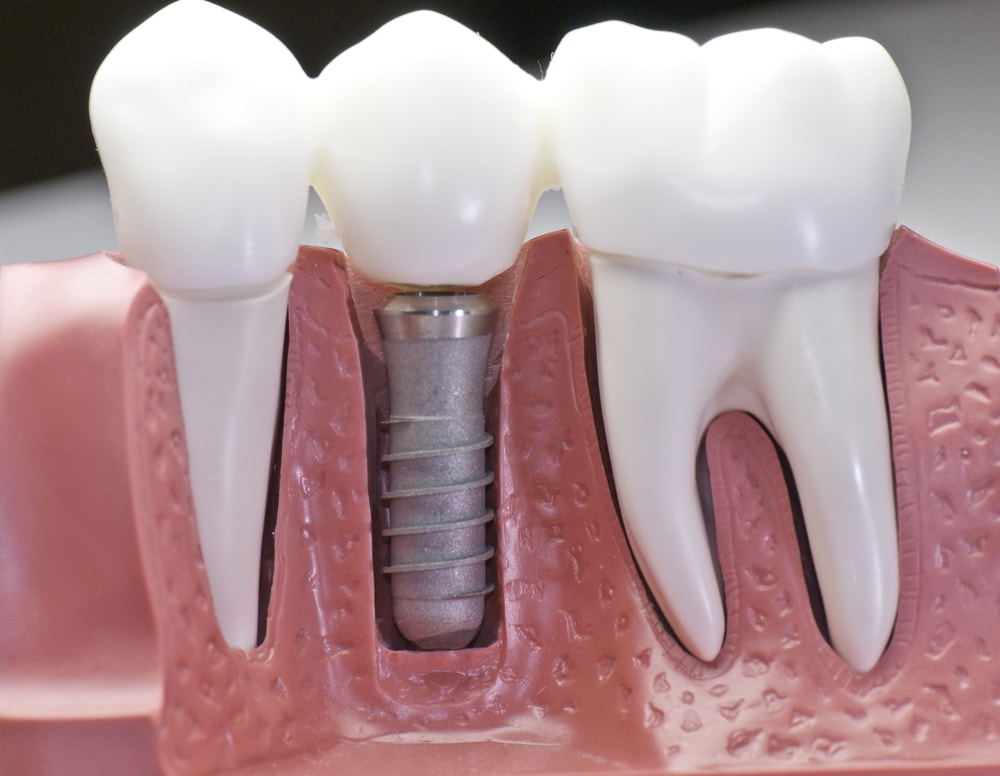Dental Sense - Questions
Table of ContentsThe smart Trick of Dental Sense That Nobody is DiscussingDental Sense Fundamentals ExplainedWhat Does Dental Sense Mean?All about Dental Sense
are clinical gadgets operatively dental implanted right into the jaw to recover an individual's capability to eat or their appearance. They provide support for synthetic (phony) teeth, such as crowns, bridges, or dentures. When a tooth is shed due to injury or disease, a person can experience complications such as quick bone loss, defective speech, or modifications to chewing patterns that cause discomfort.Oral implant systems contain a dental implant body and oral implant joint and may likewise consist of an abutment fixation screw. Professional teeth whitening. The dental implant body is operatively inserted in the jawbone in place of the tooth's root. The oral implant joint is usually affixed to the dental implant body by the joint fixation screw and extends via gums right into the mouth to sustain the connected fabricated teeth
(https://canvas.instructure.com/eportfolios/3460980/home/transform-your-smile-with-wisdom-tooth-cavity-solutions-and-cosmetic-dentistry-services)Framework of The Oral Implant System picking dental implants, speak to your oral service provider about the possible advantages and threats, and whether you are a candidate for the treatment. Things to think about: Your general health and wellness is an important element in identifying whether you are a great candidate for oral implants, for how long it will certainly take to heal, and for how long the implant may remain in area.
Cigarette smoking might impact the healing process and lower the long-lasting success of the implant. The recovery process for the implant body may take a number of months or longer, during which time you usually have a temporary joint in location of the tooth. the oral implant procedure: Thoroughly follow the dental health instructions offered to you by your oral company.
See This Report on Dental Sense
Implant failure can result in the demand for another procedure to deal with or replace the dental implant system. Recovers the capability to eat Restores cosmetic appearance Helps maintain the jawbone from reducing as a result of bone loss Maintains the health and wellness of the bordering bone and periodontals Helps maintain adjacent (neighboring) teeth steady Improves lifestyle Damage to surrounding all-natural teeth during implant positioning Injury to the surrounding tissues throughout surgical procedure, such as sinus perforation Injury during surgery (for example, crack of surrounding jawbone) Insufficient feature, such as seeming like the teeth do not bite together generally A feeling that the tooth is loose or twisting in position resulting from an abutment screw loosening Implant body failure (looseness of the implant body) as a result of systemic infection, which may be more probable in patients with unrestrained diabetes mellitus because of regional infection in bone and periodontals sustaining the dental implant body as a result of delayed healing, which may be more probable in patients who smoke Problem cleansing the gum tissues around the dental implant, causing inadequate dental health Unattended gum disease Post-surgical pins and needles as a result of nerve impingement or damage Always inform health care providers and imaging specialists that you have oral implants before any type of magnetic resonance imaging (MRI) or x-ray treatments.
FDA is not conscious of any negative events reported for MRI or x-ray treatments with dental implants. Oral implants systems are usually made of products that comply with global agreement standards of the International Company for Standardization (ISO) or ASTM International. These criteria have details of what makes a safe product.

An oral implant is a structure that changes a missing out on tooth. With screw-like gadgets, the surgeon inserts a dental implant right into the jawbone, and it acts as a support for a fabricated tooth, called a crown.
Rumored Buzz on Dental Sense
Some people are not eligible for oral implant surgical treatment. It is for oral doctors to operate individuals with: acute illnessuncontrollable metabolic diseasebone or soft cells illness or infectionIf these issues are solved, a person can have the surgical treatment. In, oral cosmetic surgeons abstain from running on individuals with: If individuals with any of the above go through dental implant surgery, there is a higher risk of the dental implant stopping working.

Dental implant surgical treatment is a customized process. Give you time to heal. Attach the post and final crown, bridge or denture.
Next, your doctor will thoroughly put the dental implant right into your jaw. Lastly, your cosmetic surgeon will certainly rearrange your periodontals and shut the cut with stitches. If your implant is near the front of your mouth, your dental professional will certainly make a temporary tooth for you to use up until you heal. By doing this, you won't have a void in your smile while you recover.
Unknown Facts About Dental Sense
Your service provider can tell you what to expect in your situation. During the healing phase, your jawbone needs to fuse to the oral implant. This process, called osseointegration, is crucial for stability and long-term success. This procedure can take anywhere from 3 to 9 months. In some instances, it might take much longer.
Once try here your implant heals, your dental practitioner can connect the abutment (small connector message) and your final repair (crown, bridge or denture). This normally takes regarding one hour to finish and might call for a 2nd minor surgery. You shouldn't feel any pain during your dental implant procedure because your supplier will use drug to numb your periodontals.